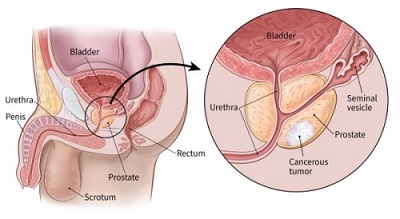
A story in the health section of the BBC caught my attention yesterday. It was filed by the BBC health editor named Michelle Roberts. The story said that Prostate cancer, the most commonly diagnosed cancer in the United Kingdom has now overtaken breast cancer. There were 50,000 registered cases of prostate cancer cases in England, a figure about 8,000 more than was seen in 2017.
According to Public Health England, more men are getting tested for prostate cancer. Celebrities like Stephen Fry and Bill Turnbull have been key campaigners in raising awareness about prostate cancer. These celebrities are using their own experiences with prostate cancer to draw other men to come out of their shells. Their efforts are being regarded as the ‘Fry and Turnbull effect’.
In 2018, there were 316,680 cancers of any kind diagnosed (in England), the equivalent of 868 cases a day. Prostate was the most common type – 49,029 cases – followed by breast – 47,476 cases. Former BBC Breakfast presenter Bill Turnbull went public with his prostate cancer diagnosis in March 2018, encouraging others to get tested, saying: “Maybe if I’d got it earlier and stopped it at the prostate, I’d be in a much better state.”He said his cancer had spread to his bones, including the pelvis and ribs. TV comedian and presenter Stephen Fry revealed in February 2018 that he was recovering after having prostate cancer surgery, saying it was “thankfully caught in the nick of time”. The coverage of Fry and Turnbull’s treatments led to an increase in men getting checked.
Sir Rod Stewart, another celebrity has openly talked about his prostate cancer diagnosis. He has urged men to have their prostates checked after revealing he had won his own battle with cancer because it was caught early. Rod Stewart’s story captured by the Mirror (U.K.) said he was diagnosed with prostate cancer in February 2016 during a routine checkup and secretly fought it for three years. The pop legend opened up about his prostate cancer during a fundraising evening with former Faces bandmates. Experts said. Rod Stewart in revealing his battle with prostate cancer could help save other lives as early stages of the cancer are symptomless and only a test can detect it. Rod Stewart is in the clear now because the cancer was seen early. We need such examples in Ghana to help remove the misconceptions and myths about cancer.
According to the National Guideline for Cancer Management, Prostate cancer is the second commonest cause of cancer death among men in Ghana.. It is therefore an important health concern. Evidence from screening programme in Ghana showed a high prevalence rate of about 7% in Ghanaian men between 50-74 years. The purpose of cancer screening is to prevent deaths from cancer by reaching diagnosis at an early (asymptomatic) stage when the disease is still curable. About a third of cancers can be prevented. Another third can be cured if seen early. Another benefit of cancer screening is to prolong life, improve quality of life by avoiding complex treatments and therefore reducing costs to the person affected and society.
Prostate cancer can be detected as early as the third decade of life. The prevalence of prostate cancer increases with age. About 30-60% of men in their fifties and sixties harbor prostate cancer. The disease is relatively rare in men under the age of 50 years. Incidence of prostate cancer increases in men over 60 years. There is a higher incidence of prostate cancer in Africans and men of African descent. Men with a first-degree relative affected by prostate cancer have a 2-fold risk of developing the disease themselves compared to men without a family history. Men with an affected second-degree relative have an increased relative risk of 1.7 of developing the disease. Men with both first- and second-degree relatives affected have an increased relative risk of 8.8 of developing the I become a potential chemopreventive natural agent. Cocoa flavonoids interfere at the initiation, promotion and progression of cancer (Martin et al. Potential for preventive effects of cocoa and cocoa polyphenols in cancer. Food Chem. Toxicol. 2013 Jun, 56:336-51). Consume more cocoa and safeguard your health.
DR. EDWARD O. AMPORFUL
CHIEF PHARMACIST
COCOA CLINIC



